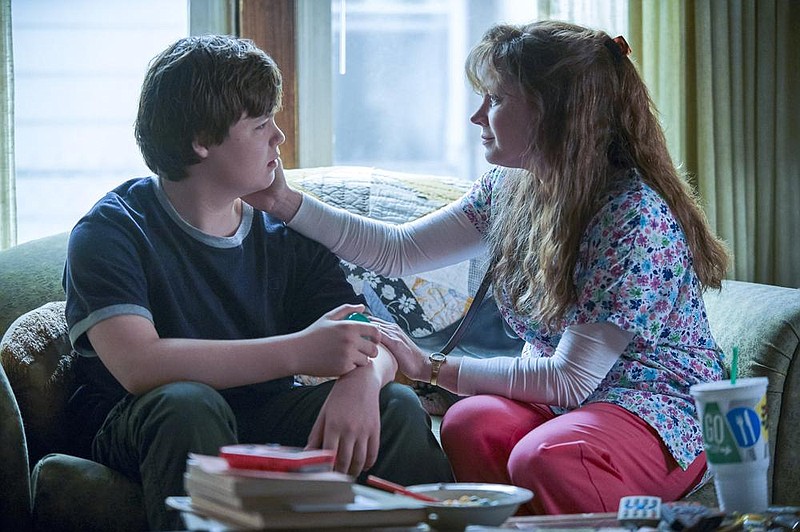There has been a lot of derision from critics as to the merits of the Netflix adaptation of the J.D. Vance memoir -- "Hillbilly Elegy" -- about the author growing up with a dysfunctional family in rural Kentucky, and small-town Ohio, before graduating Yale Law School. But to my mind, the film isn't as bad as all that. No, it isn't much good, but there's enough effort put in from its cast -- in one case, perhaps a bit too much effort -- to keep it from completely collapsing. Where it runs into predictable trouble is the filmmaking concept itself.
Instead of the acting -- as long as you can stand seeing Glenn Close and Amy Adams emoting while dressed in a succession of Salvation Army hand-me-down jeans, with freckled age makeup, padded weight appliances, and fried hair that looks like it's been washed with industrial solvent and Brillo pads -- the real trouble begins and ends with the film's director, Ron Howard.
Howard had amassed a dazzlingly successful career, but the worst thing that ever happened to him was winning the Oscar for the wildly overrated "A Beautiful Mind" -- which convinced him and producer partner Brian Glazer to embark on harder, less genial films concerning humanity and its frailties, a decision that has given us a series of films ranging from the wincingly atrocious "In the Heart of the Sea," to the hacky dreadful "The Dilemma."
By all accounts, Howard is one of the genial good spirits in Hollywood, and it pains me to point this out, but ("Dilemma" aside), it's pretty clear by now he's a decent comedy and light drama director, and can find the emotional through-line in nearly any narrative (a topic he sort of jokes about himself on later seasons of "Arrested Development"), but when he goes grasping at weightier topics, he doesn't have the heart to see them through.
Vance is played as a youngster by Owen Asztalos, and then as an adult, having just graduated out of law school and desperately looking for a first job, by Gabriel Basso (kudos to the casting department for giving us a pair of actors who could reasonably be seen as the same person). In both cases, he's a decent, smart fellow, weighed down by the insanity in his life brought on by his seriously bipolar mother, Bev (Adams), who goes from sweet and vulnerable, to furious and abusive at the blink of a nanosecond.
In one harrowing scene -- told, as much of the rest of the film, in distracting flashback -- young J.D. is in the car with his mom after a perceived insult has suddenly darkened her mood. She speeds up their Jeep to discomfiting levels, screeches to a halt, slaps him up, and then charges after him like a raging cheetah after he slips out the door and tries to get help at a nearby house.
Hers is a known quantity of crazy to the rest of her family, including her own Mamaw (Close, peering at all of this madness from behind a thick pair of bifocals), who seems helpless to keep her daughter from going over the emotional cliff again and again, before her mood swings ultimately lead to a significant substance abuse problem.
It is this heroin usage that has put his mom in the hospital, news relayed by his long-suffering sister, Lindsay (Haley Bennet), which comes to him at the exact week the now-graduating J.D. needs to meet with various legal high-rollers from different firms in order to procure a job for himself and his loving girlfriend, Usha (Freida Pinto). Committed as he is to protecting his family, as having been officially tasked by his then-dying Mamaw to take care of everyone, J.D. returns to Ohio, putting his all-important career path in serious jeopardy.
To that end, Howard shapes the narrative into a race against time: Can J.D. find a safe place for his still keening mother, and address the emotional turmoil and trauma from his childhood, in the short span of time he has before his last-chance interview with a prestigious firm that could hold the key to his career and his life with Usha?
Splitting all that driven drama into ungainly pieces, the script, by Vanessa Taylor, keeps hurtling us back and forth in time, sometimes in exceedingly clumsy, obvious fashion (a current scene after a Bev freakout, with a character asking seemingly rhetorically "What sent her over?" leads immediately to yet another flashback scene of the kind of dramatically horrific thing that did, in fact, do the trick), and rarely without its seams showing.
Yes, the normally reliable Adams is working all too hard, achieving a strident sort of emotional imbalance that feels both too much and not enough, and yes, Taylor's screenplay is chock-full of clunkers (Mamaw's many hissed pronouncements -- "I wouldn't spit on her * if her guts were on fire" -- sound like parody), but what the film truly misses is the depth of raw emotion and misery with serious addiction. Instead of delving more deeply in the darkness of the disease, and lingering long enough for it to make an impact, Howard dances about the problem, mistaking intensity for depth.
We get a great many scenes of Adams bawling or flipping out on someone, but all that serves to cover over the deeper problems present in Bev's emotional torment. It's as if Howard wants us to watch the spectacle of addiction and mental illness from a distance rather than feel it for ourselves, in much the same way he treated his previously heralded "Beautiful Mind." Then, as now, it feels surface and cowardly, appealing to the masses by making sure their sensibilities aren't too far pushed down into the muck of actual anguish.
"Hillbilly Elergy" is in select theaters and streaming on Netflix.
